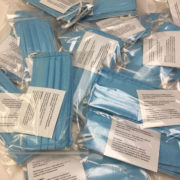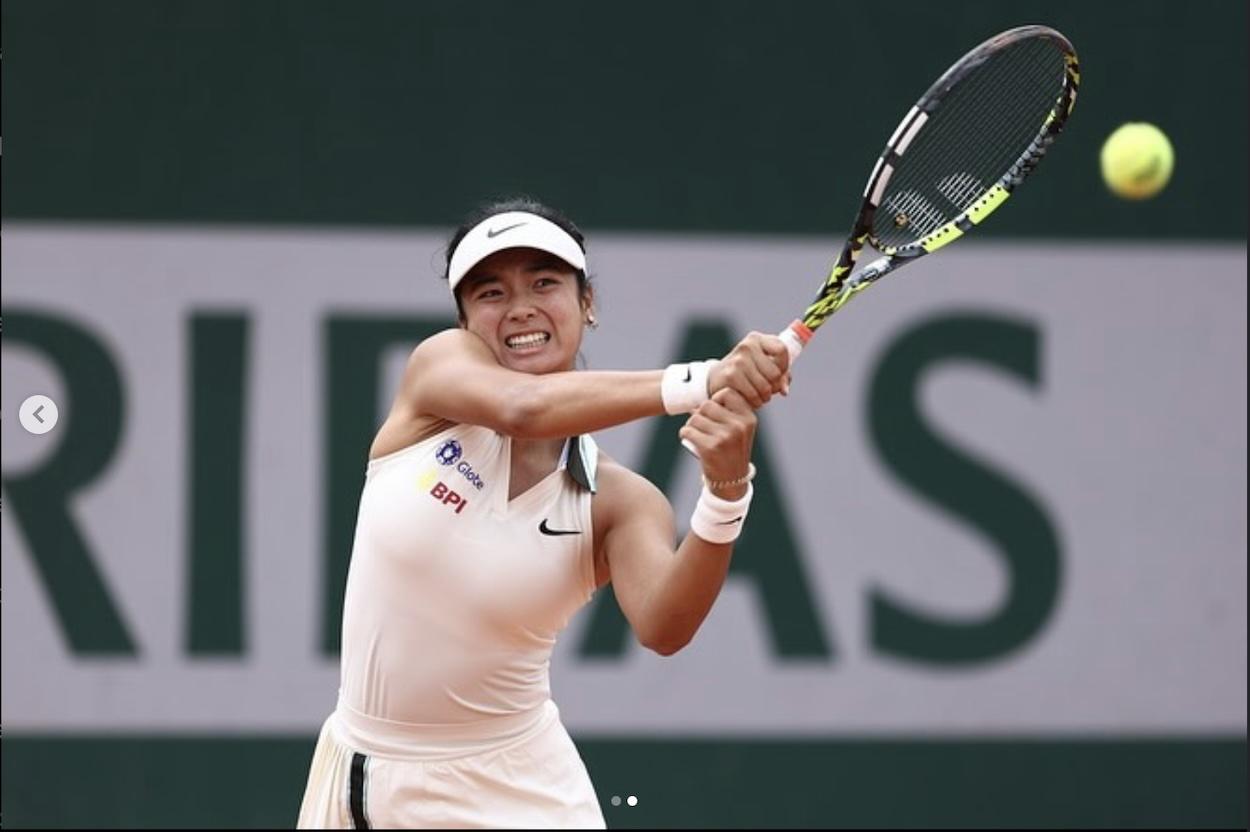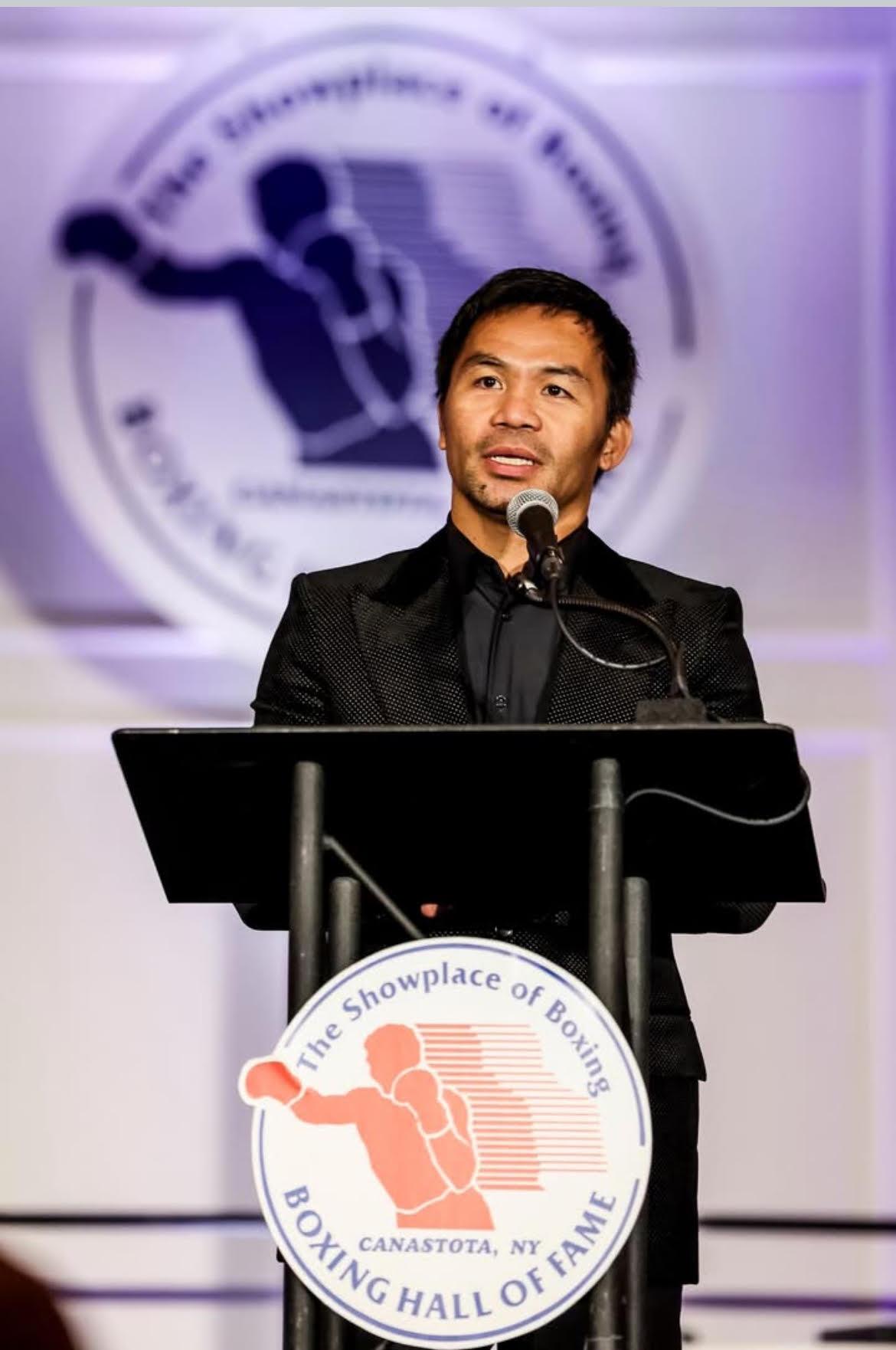For several Filipino American designers, the spring season usually brings in orders for wedding dresses, debutante gowns, and outfits for other special occasions.
But amid the coronavirus pandemic, cities like Los Angeles have ordered the closure of nonessential businesses and put large gatherings on hold.
Instead of sitting idly by, designers are re-shifting their focus and putting their sewing machines to work to meet the national demand for face masks, including those for front-line health care workers.
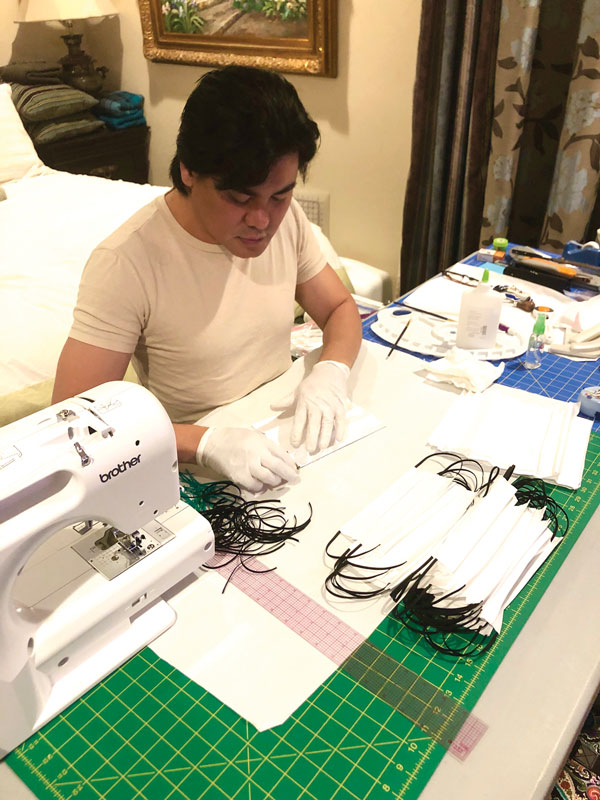
“It was natural for me to do this because of my training. I knew the need firsthand because most of my California brides are Filipina nurses. Many of my regular Filipino clients are in the health care industry, whether as doctors, operators of home care, rehab, or spa businesses,” Oliver Tolentino, a celebrity couture designer based in Beverly Hills, California who spent the earlier months of the year designing attire for red carpet events, told the Asian Journal.
His masks are made of polyethylene fabric — a common material used for surgical face masks — mimicking the pattern used by major manufacturer 3M with pleats, a nose wire and garter.
“I use non-toxic glue to seal floral wire (or ‘twisties’ used to seal bread loaves) [on] the top of the mask so it can fit snugly around the nose. I sew the pleats at the side and double-stitch the garter to secure it,” Tolentino added.
Once he posted a photo of himself making masks on social media, he started receiving messages from followers from around the United States and back in the Philippines asking whether he would sell his creations. However, he said he will be donating them and not charging.
Kristine Amarillo, who has her LA-based line Tale for Esther, began production with fabric she already had on hand after her own family members and friends who are nurses and caregivers desperately said they needed face protection.
“My sister is a nurse and she was very disappointed to find out that the CDC recommends only wearing surgical masks if you are directly taking care of a suspected COVID patient and wear the N95 respirator only when intubating a patient during a code blue. This is brought upon by the worldwide shortage of PPEs,” Amarillo said.
Her sister’s hospital was reportedly following those recommendations so fellow nurses have been worried since individuals can also have the virus but be asymptomatic.
“The thought of having these health care workers — especially having a family member — battle this pandemic with little protection pushed me to help. I gathered whatever materials I have and started making masks,” she added, describing the creation of washable and re-usable masks with pocketing in the inner lining so the health care workers can change the filter daily.
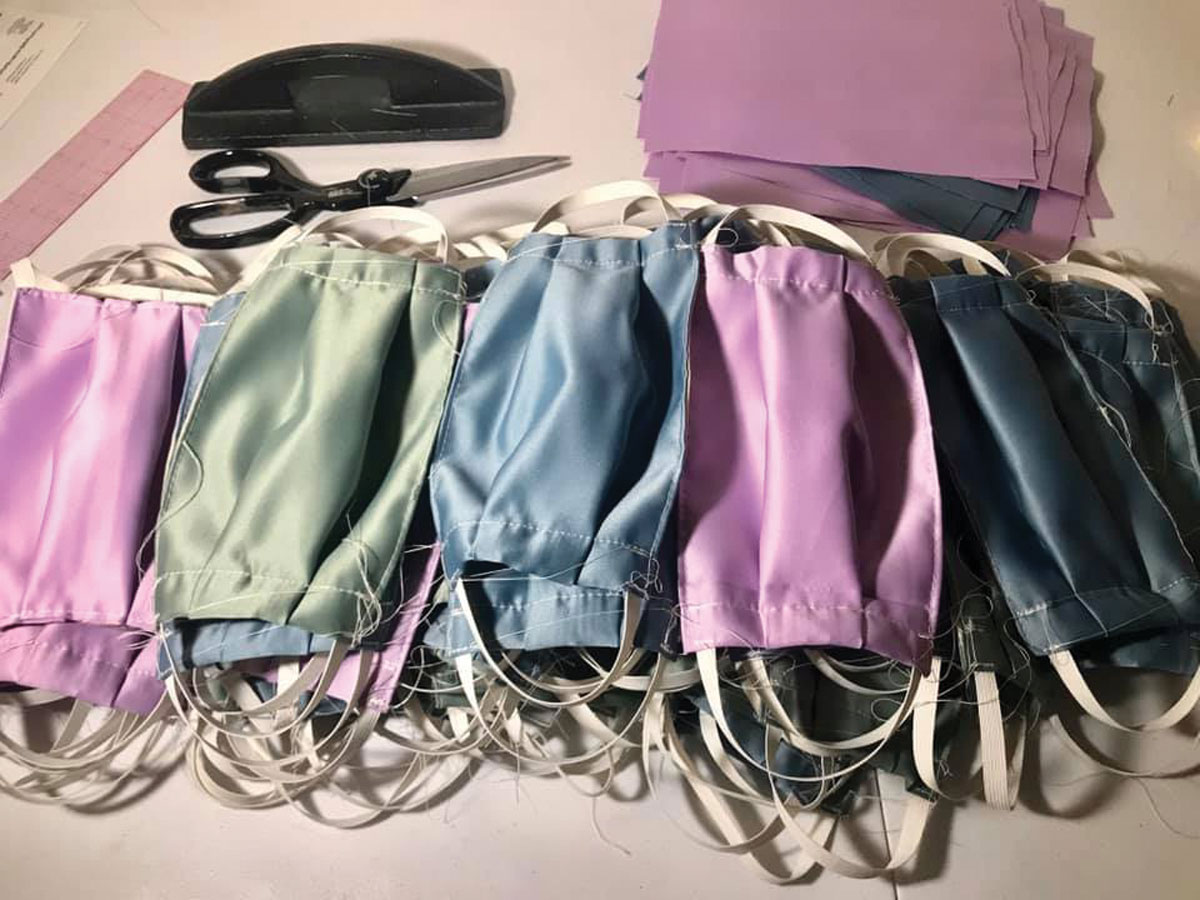
So far, she has made over 100 pieces and has shipped them to contacts across California and in Florida, Hawaii and Montana, and will continue producing until her fabric runs out.
While business for Alexis Monsanto, also a couture designer, hasn’t entirely slowed down since clients have events later this year, he turned his atelier along Melrose Avenue in LA into a production line for making medical grade masks.
“I currently have orders for weddings but I’ve pivoted my production to the facial masks to help meet the demands in the market,” he said, sharing stories of nurses having to reuse their PPE or get creative to shield themselves.
As of the beginning of April, he and his crew of five sewers have produced 1,400 washable masks, following standards by the Centers for Disease Control and Prevention (CDC), using 100% Egyptian cotton with an 800 thread-count for the outer layer and an inner layer of polypropylene.

Of that number, 800 will be donated to various organizations, including Downey Rehab Facility, Asian Pacific AIDS Intervention Team, and the AIDS Healthcare Foundation locally in LA, while the remaining 600 will be shipped around the country. Each mask is packaged in plastic to ensure cleanliness.
Last month, Mayor Eric Garcetti announced “LA Protects,” a partnership with the fashion and garment industry to make protective gear and other medical supplies for frontline workers.
The initial target for the initiative is the manufacturing of 5 million non-medical masks for people who need protection — grocery store workers, non-medical staff in hospitals, and others providing essential services during the COVID-19 crisis, according to the mayor’s office.
“I have fabric vendor connections, factories and friends willing to pitch in financial help to pay labor cost to the contractors. It’s made in Los Angeles and in doing so, I’m keeping the operators on their livelihoods instead of them getting laid off,” Monsanto said, adding that he’s in touch with the offices Garcetti and California Governor Gavin Newsom who have a list of hospitals and facilities in dire need.
Monsanto said he will continue pushing out 1,500 to 2,000 a week and move to sell them as this week, LA issued guidance directing residents to wear face coverings — such as a bandana, scarf or other cloth — when leaving their homes. The city, however, said medical grade masks should be reserved for front-liners.
The CDC on Friday, April 3 also updated its guidance for Americans to cover their faces in public areas where social distancing is hard to maintain, such as the grocery store, because the virus can “spread between people interacting in close proximity.”
Joey Galon said he was starting to get “stir crazy” staying in and was compelled to create with his hands since orders for formal attire have ceased.
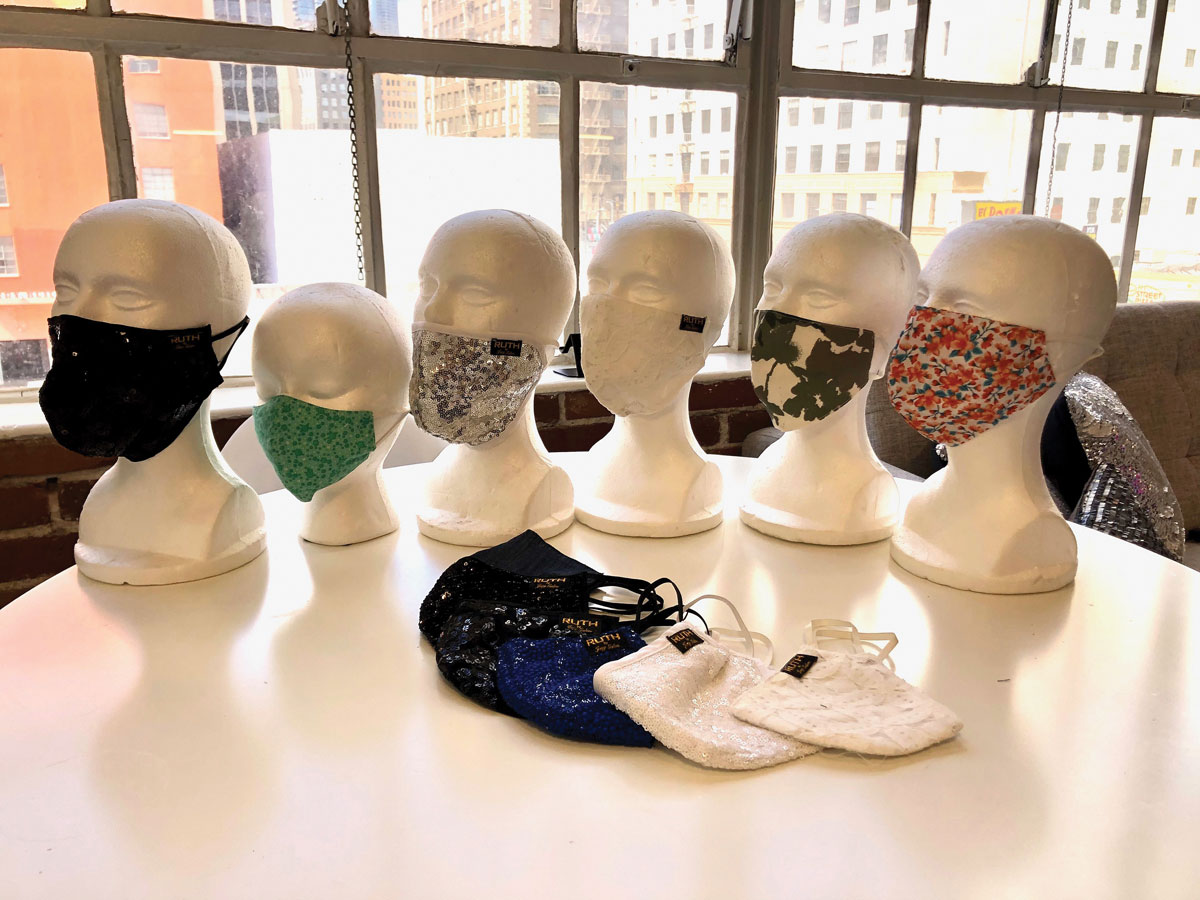
Galon’s designs are washable, breathable and decorative, using lace and sequin embellishments or whimsical patterns like snake print or florals. However, they should only be used by those who are stepping out for an activity like going to the market and not those who work in the medical or other essential fields.
“For me, one challenge has been keeping up with the demand of the orders,” he said, sharing that one local company has ordered 100 masks while groups in Hawaii and Atlanta have requested as well. “It’s a simple template and pattern but it’s amazing how many hundreds of orders are coming in. I’m just a one-man show, not a manufacturer with a lot of machinery.”
He added that he’s also looking to work with the mayor’s office for fabrics to join in the LA Protects effort.
Other Fil-Am small businesses have also shifted to mask making. Handbag designer Gina Alexander announced her efforts to produce medical grade masks. Manahan+Co, an apron company, is selling masks and will donate $1 of the proceeds to the Pilipino Workers Center. ELLERALI, a brand that uses upcycled fabric, has donated 100 masks to hospitals and is selling masks that include a pocket for extra filter protection and a slit for a removable nose bridge.
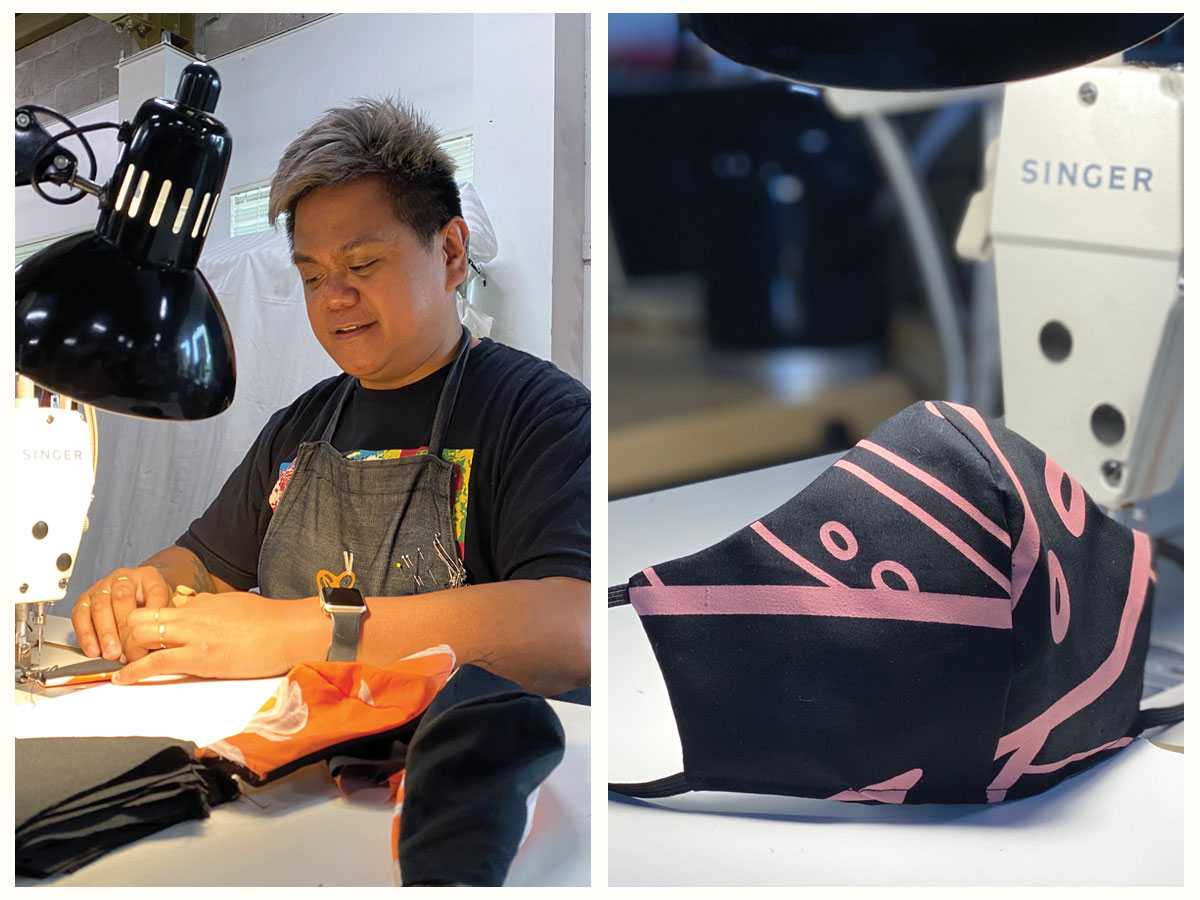
Hawaii-based designer Kini Zamora, who’s known for his stint on “Project Runway,” told the Asian Journal that he knew people would need to fill their time under quarantine, so he decided to record a series of “how-to” videos on YouTube. The first release in mid-March was a tutorial on how to make a personal mask using cotton fabric, elastic and basic tools from the comfort of their homes.
By making their own masks, Zamora said, it would prevent regular individuals from buying the ones reserved for front-liners. He and his team also started making dozens of masks for health care professionals in the Honolulu area before he closed down his workshop.
“I love that everyone is just collaborating and so many designers are coming on board every single day to help with the efforts. It’s not just designers, but everybody at home who’s pulling out their sewing machines,” Zamora said. “That was my intent when I created the YouTube video to make sure that people are keeping busy at home and helping out.”


